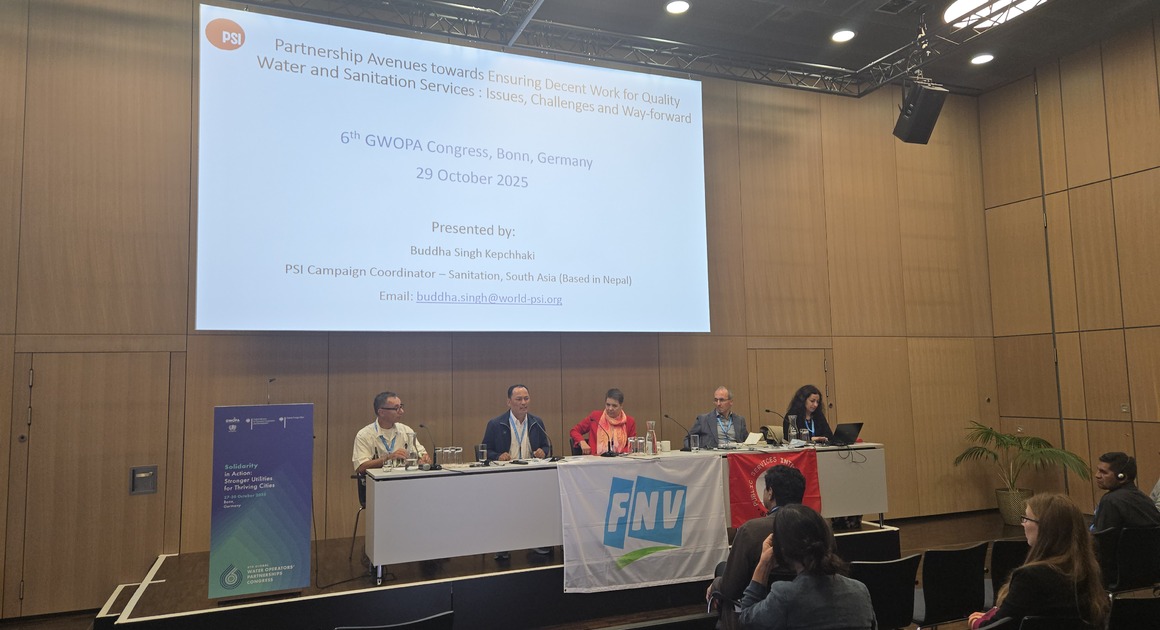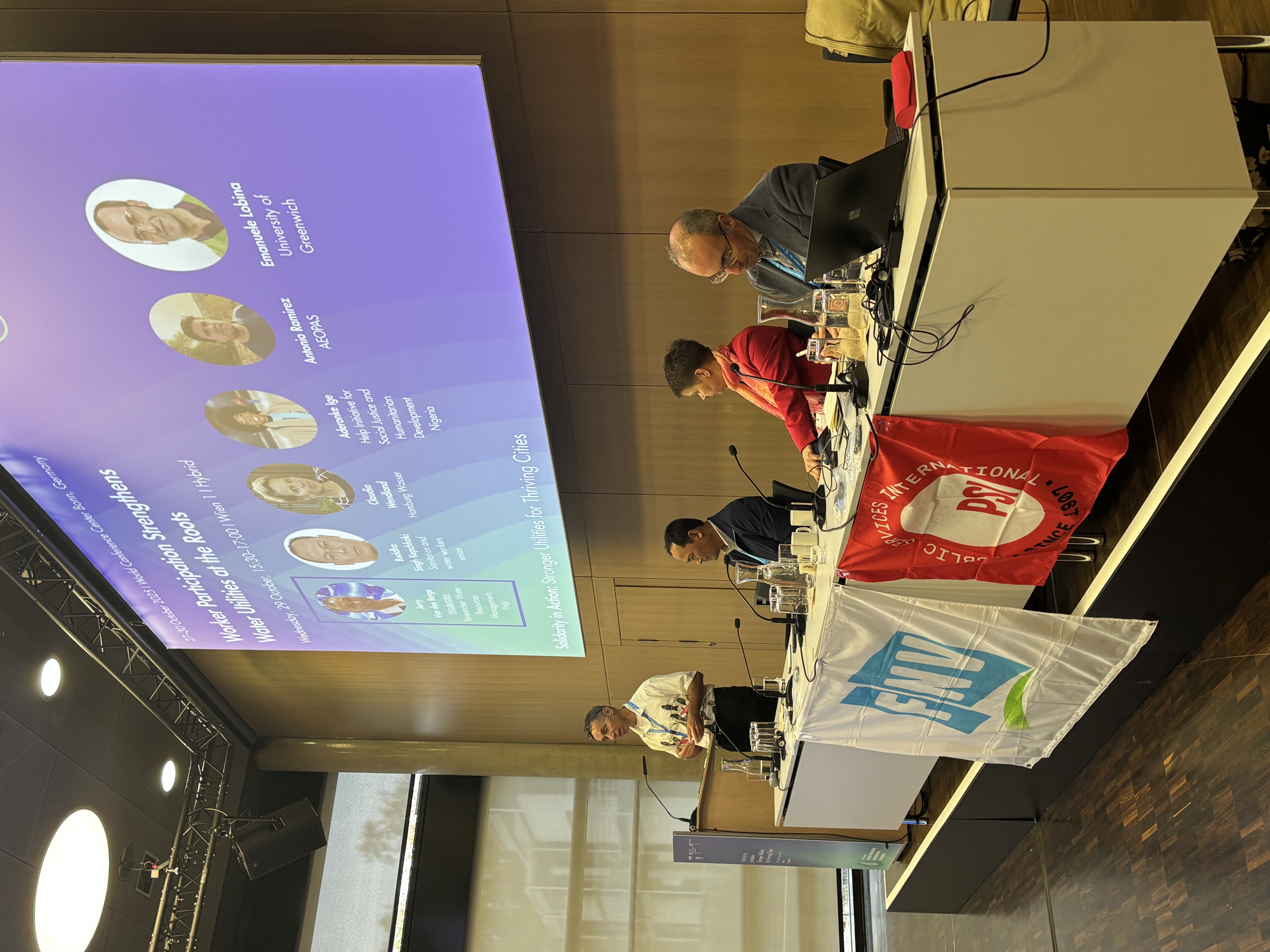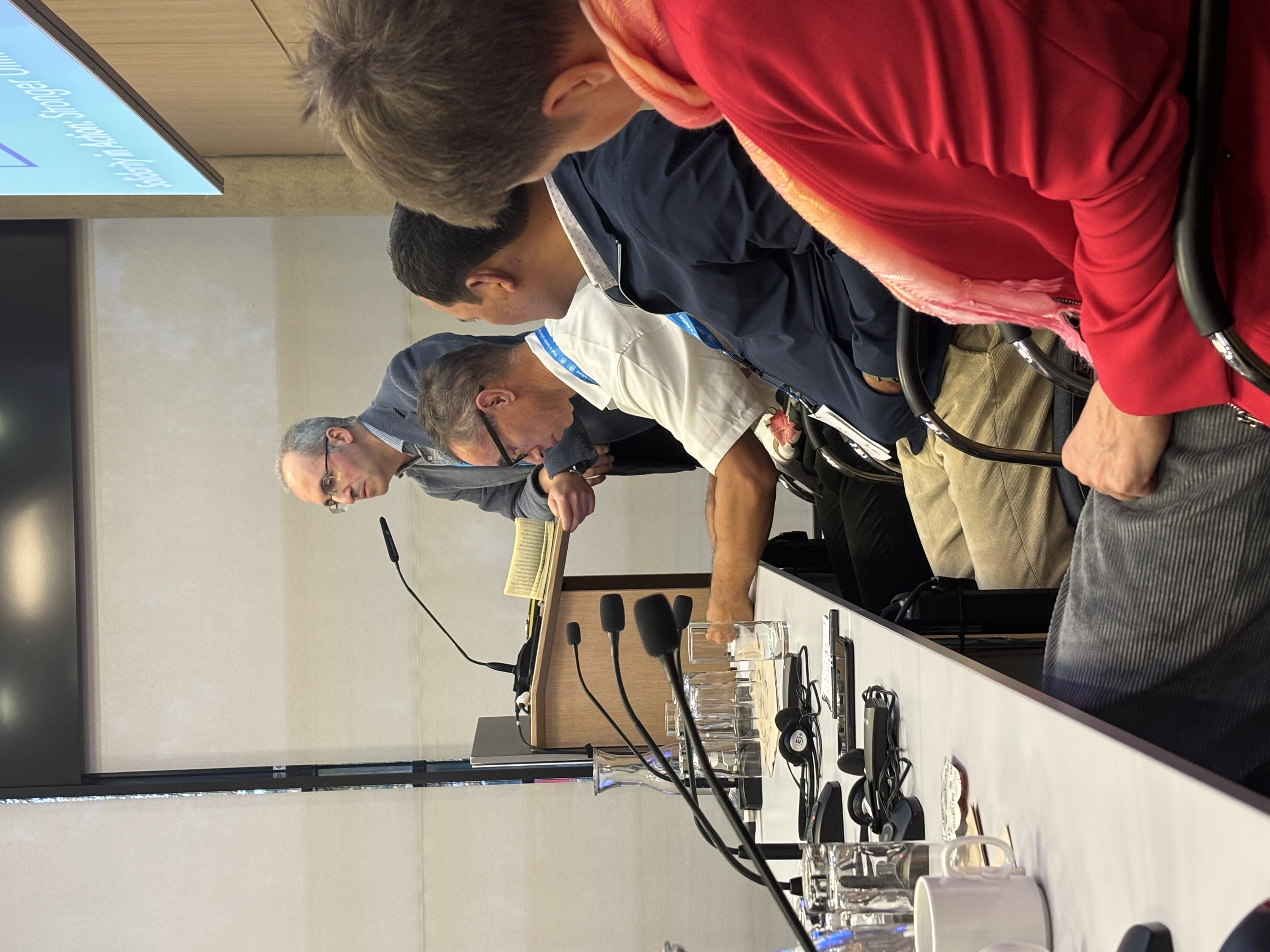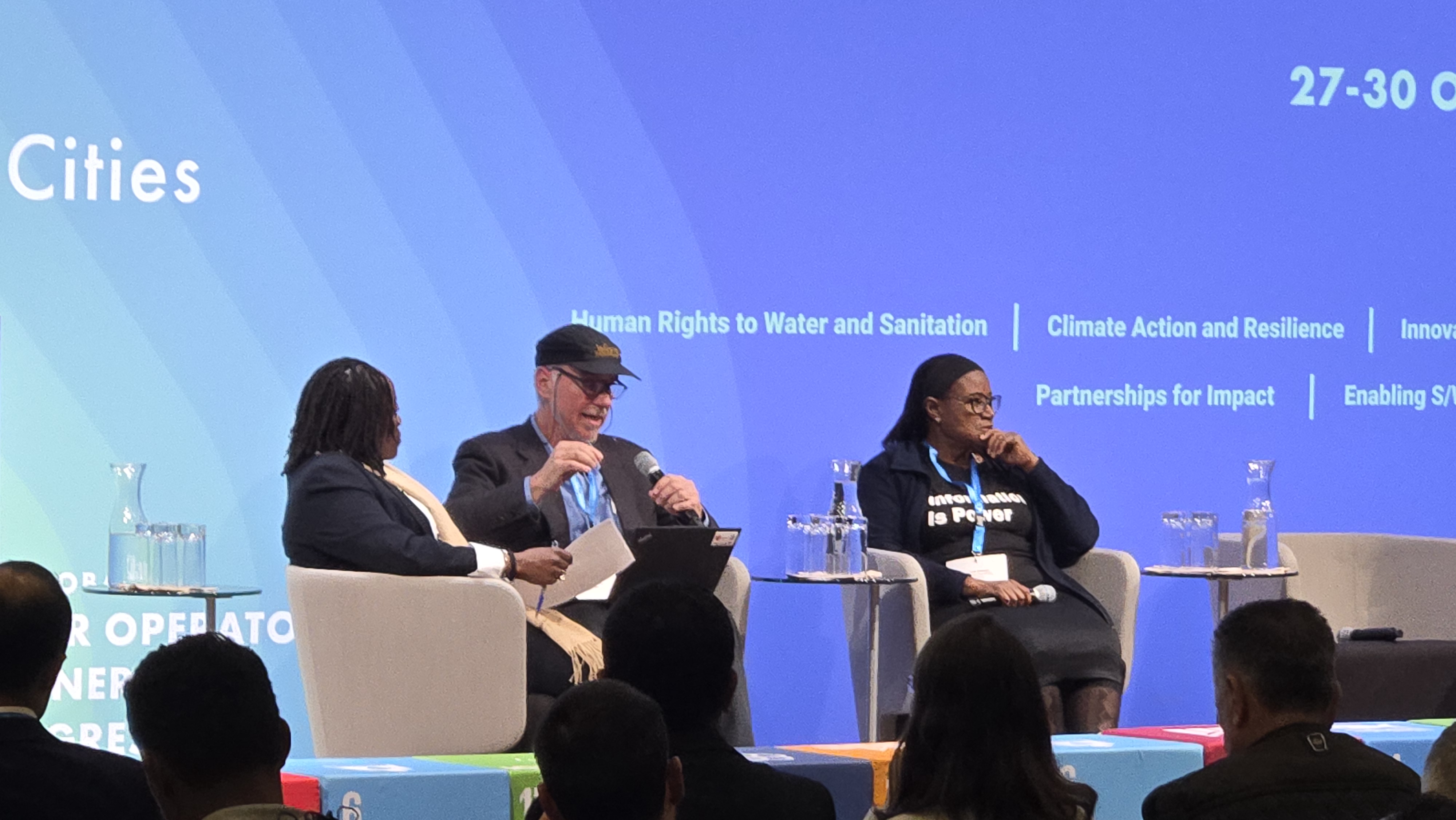GWOPA Congress Decent Work is Essential to Ensure the Human Right to Clean Water and Sanitation

A PSI delegation including FNV representatives contributed to the 6th Global Water Operators’ Partnerships Alliance (GWOPA) Congress in Bonn, 27-30 October. PSI played a key role in the establishment of GWOPA in 2009, and has been actively involved since its onset. PSI and the FNV represent workers and trade unions on the GWOPA Steering Committee.

David Boys

Daria Cibrario
A PSI delegation including representatives from Dutch union FNV contributed to UN Habitat’s 6th Global Water Operators’ Partnerships Alliance (GWOPA) Congress in Bonn, Germany 27-30 October 2025. PSI and the FNV represent labour on GWOPA’s International Steering Committee.
GWOPA exists largely because PSI and the global water justice network in 2006 successfully resisted the French government’s attempt to make water privatisation the official policy of the United Nations. UN Secretary General Kofi Annan recognised the argument that the world’s thousands of public water utilities need a system whereby they can help each other improve. Kofi Annan mandated UN Habitat to build this system.
Leap forward to the present and the GWOPA team has organised hundreds of partnerships between public utilities, whereby utility personnel get training and support to address their challenges. Surprisingly, many of the utilities offering the training say that their staff return, also with new knowledge and more motivated. However, we need thousands of these partnerships as the Sustainable Development Goal 6 (SDG 6) of universal access to water and sanitation is far from being met.
A persistent problem has been that the big international development banks (e.g. the World Bank, the Asian Development Bank, the European Bank for Reconstruction and Development, etc.) have, until now, largely ignored GWOPA and have not provided any funding for these non-profit partnerships. This may be changing, as they perhaps realise that their capital-intensive loans and grants do not perform as well as they intend, and that the peer-to-peer training and support may be a missing key in their projects.
The international development banks were present at the 6th GWOPA Congress, some with their consulting firms. Their approach is to develop ‘bankable projects’ that the market can invest in. If you peel away their market biases, it means aiming to ensure that the staff of the utilities get more tools and skills to perform their work better, including to plan, build and maintain the capital-intensive projects such as extending pipes, building water and sewage treatment plants, etc.
If the international development banks are serious about working with GWOPA, then the representatives of labour and civil society on the GWOPA board will need to exercise careful vigilance to protect and preserve the public nature, ownership and management of these utilities. Today’s privatisation push no longer focuses on the large French private water operators Suez and Véolia: instead, it seeks the financial and managerial involvement of the giant asset managers and private equity firms, such as Blackstone, currently in the water sector in Brazil.
Within the 6th GWOPA Congress, labour representatives organised a panel entitled "Worker Participation Strengthens Water Utilities at the Roots", with contributions from Hamburg water and wastewater utility Hamburg Wasser; the Spanish Association of Public Water Supply and Sanitation Operators (AEOPAS); University of Greenwich's PSIRU; and a community activist from Lagos.
PSI's Organiser for sanitation workers in South Asia shared the working conditions of informal sanitation workers in Nepal, Bangladesh, Pakistan and India, who provide this vital service to the community and to the local water and sanitation utilities through outsourcing companies (paid by municipalities) that have no regard for their dignity as human beings and workers.
PSI is organising them - with the support of Dutch union FNV Overheid – to ensure their fundamental human and labour rights are respected. To know more, watch PSI's documentary "Dangerous Gutters"). The realisation of the human right to clean water and sanitation (SDG 6) – requires simultaneously upholding of decent work for all (SDG 8) for water and sanitation workers worldwide.
Worker Participation Strengthens Water Utilities at the Roots
A PSI delegation including FNV representatives contributed to the 6th Global Water Operators’ Partnerships Alliance (GWOPA) Congress in Bonn, 27-30 October 2025. PSI played a key role in the establishment of GWOPA in 2009, and has been actively involved since its onset. PSI and the FNV represent workers and trade unions on the GWOPA Steering Committee.
The event gathered almost 550 participants from utilities, governments, development partners and civil society from over 70 countries. The goal of the GWOPA Congress is to showcase how peer-to-peer cooperation strengthens public water utilities, empowers water professionals, cross-fertilises and scales-up practical solutions for progress towards universal access to water and sanitation.
Within the Congress, on 29 October, labour representatives highlighted the fundamental role of water and sanitation workers at a panel "Worker Participation Strengthens Water Utilities at the Roots", which gathered contributions from University of Greenwich's PSIRU, Hamburg Water, the Spanish Association of Public Water Supply and Sanitation Operators (AEOPAS), and the Help Initiative for Social Justice and Humanitarian Development (Nigeria).

The session provided evidence of the critical importance for utilities and Water Operator Partnerships (WOPs) – GWOPA’s modus operandi - to be grounded in worker participation and to meaningfully involve water and sanitation workers and their trade unions to ensure service quality, equitable access and sustainability of the service provision and the partnership.
The session was moderated by Jerry van den Berge, FNV and University of Wageningen, the Netherlands, Labour representative in the GWOPA Board.
During the panel discussion, Buddha Singh Kepchhaki, PSI's Organiser for sanitation workers in South Asia, told the audience about the working conditions in which informal sanitation workers in Nepal, Bangladesh, Pakistan and India provide this vital service to the community and to the local water utilities. These workers are hired by outsourcing companies which, although paid by municipalities, have largely disregarded their dignity as human beings and workers. PSI is organising them into trade unions - with the support of the its Dutch trade union affiliate, FNV Overheid – to ensure their fundamental human and labour rights are respected.
PSI's documentary "Dangerous Gutters" was shown during the session, providing evidence of unacceptable working conditions in which a sanitation worker from Bangladesh supplies sanitation services to the community, while being stigmatised and exploited. These workers keep South East Asia’s cities clean, but their contribution is not acknowledged and recognized by the citizens and authorities, and they are regarded as pariahs. Sanitation jobs are so-called “3D” jobs (difficult, dirty and dangerous) and are exposed to serious occupational safety and health (OSH) risks. They and their families suffer income insecurity because of the informality, which perpetuates the cycle of decent work deficit and poverty.
Video
Stand in solidarity with South Asia's sanitation workers in their fight for safety and dignity at work.
Dangerous Gutters: South Asia's Despised Sanitation Workers
“Sustainable Development Goal 8 (SDG 8) of Decent Work needs to be fulfilled for these workers, just as we seek to fulfil SDG 6 on universal access to clean water and sanitation. The two need to go together. SDG 8 needs to be upheld for sanitation workers including freedom of association and collective bargaining. Only when we can fulfill jointly SDG 8 and SDG 6, we can fulfill SDG 11 Sustainable Cities” said Kepchhaki.
“As sanitation and water are basic, essential services, there needs to be adequate investment not only in public water and sanitation infrastructure, but also in worker wages and working conditions, OSH, skills and training. Governments and water operators are responsible for the services, and for these workers. Trade unions and water operators can be partners. Negotiations with their unions is key”.
Claudia Wendland, Water and Sanitation Specialist at Hamburg Wasser, Germany, said the key figure for Hamburg Wasser was 2,200, which is the number of its employees. Hamburg’s public water operator participates in the German dual system of vocational training, where apprentices are paid a living wage and most of them stay with the company, and where staff of different German utilities train and support each other. Hamburg Wasser also participates in WOPs in Tanzania, South Africa, Jordan and Ukraine, educating workers, helping them understand the full water treatment cycle, reducing the use of the chemicals while optimising water quality. Its WOPs include teams from all the professions, skill levels and generations.
“Workers are critical to this process and their training and involvement is absolutely essential to high quality water and sanitation services” Wendland said. “Hamburg Wasser’s experience through WOPs proves that young workers… can increase their professional satisfaction through enhancing international cooperation across water operators, all while bringing good practices back home that benefit Hamburg Wasser. The results have been truly important, in terms of worker engagement and career development, developing new good practices and cross-fertilisation and creating real teamwork across the different operations of the water operators worldwide”.
Antonio Ramirez, Project Officer for the Spanish Association of Public Water Supply and Sanitation Operators (AEOPAS), Spain, (online) explained that AEOPAS has a number of cooperation agreements with Latin American water operators and develops training manuals and digital tools like mobile apps that can work offline to help small water operators manage the water cycle and monitor the different water plants they supervise. These tools can be especially helpful to water operator heads in rural areas, as these often supervise many different plants with limited staff. Yet, they often have big responsibilities.
“The small and medium water operators are often unable to participate in international cooperation as they have less resources, less time and less staff, unlike those in urban areas. Therefore, they have to resolve issues in a more artisanal way than with digital tools. This is why we also share Spanish nature-based solutions for water purification that can be useful to water and sanitation workers in other countries,” said Ramirez. “Besides, at AEOPAS we promote key principles, notably the fact that water is a human right, and utilities should be operated in a public good basis as it is a common resource and should not be privatised and commodified”.
Aderonke Ige, Nigerian activist and human rights lawyer of the Help Initiative for Social Justice and Humanitarian Development of Lagos, Nigeria, explained that the situation of South Asian sanitation workers resonated with African countries. She explained how working through networks, coalitions, partnerships and collaborations among workers and trade unions, civil society organisations (CSOs) and water and sanitation users proved effective to sensitise local communities to the critical importance of embracing the struggle for workers’ rights in their work for equitable access to clean water and sanitation.
“We promote the involvement of workers in government’s decision-making and policy development processes. This is a challenging process as in many countries workers are seen as less important than the elites, even if they are the engine of government. Workers' rights are often viewed as a ‘priviledge' by the government. We seek to break these biased assumptions by applying a tripartite dialogue approach: workers and their unions; government at all levels; and civil society, including water users and communities. Through this process we seek to integrate communities to our collective struggle for our common good” Ige said.
“When the public sector works effectively and workers are treated correctly, we will we have a good, sustainable resource for all. Unfortunately, the public sector is often underfunded, workers are unskilled, understaffed, and under-resourced, so that pro-private forces can make the case of 'inefficiencies' against the public sector and, by extension, make way for privatisation. The strategy of facilitating interactions and engagement of water workers in Africa with their international peers and systems, South-to-South and North-to-South cooperation, helps empower them to structure their demands towards delivering quality services that benefit the society, communities, and users alike.
Finally, Emanuele Lobina, Associate Professor at the Public Services International Research Unit (PSIRU), University of Greenwich, UK, affirmed that WOPs are a brilliant idea and a great initiative, but warned of the renewal of the privatisation push of the late 1990s-2000s in its new guise of ‘innovative and blended finance’.
“Are we forgetting what happened over the past 25-30 years? The flagships of water privatisation failed one after another, in Buenos Aires, La Paz, Jakarta, Accra, Dar es Salaam, Paris, Berlin, Atlanta, to name but a few. Private finance also fails water services and users. For instance, private finance de-risking with the Kenya Pooled Water Fund failed to issue one single bond. WOPs are not for such adventures,” Lobina said.

He also reminded the audience of the lessons of good practices and capacity that exists in the public sector which is not submitted to the imperative of profit extraction: the revenues from the public service can be directly reinvested in the service, lowering fares and enhancing network access and water quality.
“To have quality water and public services you need quality inputs, including quality jobs. Quality water services can benefit from workers and trade unions participating and having a big role in WOPS – they should also innovate formulas of workers twinning among themselves, and exchanging knowledge with management. We have documented these cases– in Debrecen, Hungary or in Kaunas, Lithuania – where labour-management partnerships and twinning between unions did work,” Lobina concluded.
The motto of this GWOPA congress was “Solidarity in action”: trade unions breathe solidarity day in, day out. WOPs should work on peer learning partnerships not only among managers but also through labour-management cooperation based on constructive dialogue.

“Gen Z is rebelling worldwide: in Sri Lanka, Nepal, Indonesia, Morocco, Madagascar, Chile, because they do not have universal access to quality public services. Securing that access is a major way to reduce inequalities,” Boys said. “We don’t need the innovative finance that brings in giant private equity managers, we need innovative finance to support the peer-to-peer partnerships. And even if we know that SDG 6 will not be met by 2030, we should not get discouraged. Rather we need to work harder with more determination, and GWOPA and WOPs are part of the solution”.